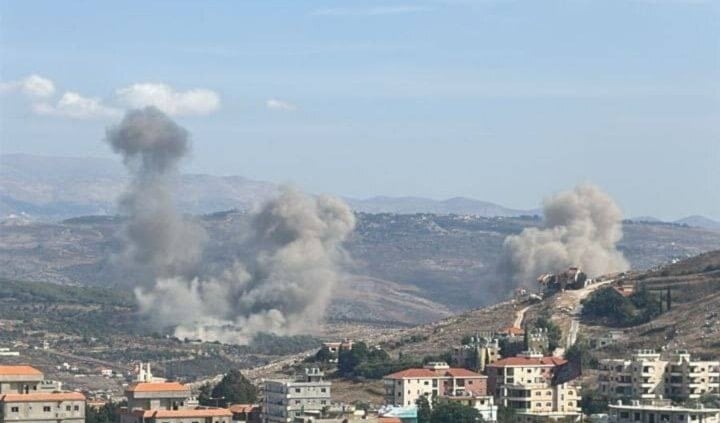US failed to push "Israel" into ceasefire compliance: Lebanon Dep. PM
Lebanon rejected a proposal by "Israel" for political negotiations, with Nabih Berri confirming the collapse of talks after Tel Aviv rejected a US initiative.
-

Smoke rises following Israeli airstrikes on Jarmaq, Lebanon, October 20, 2025 (social media)
Lebanese Deputy Prime Minister Tarek Mitri told Al Mayadeen that the Israeli occupation had requested, through intermediaries back in March, to engage in political negotiations, a request which Lebanon rejected, revealing that Beirut insisted that any discussions remain limited to military representatives, emphasizing:
“Lebanon insisted that the negotiations be conducted between military officers, and at best, joined by civilian advisers.”
He added that talks at the political level were never considered by Lebanon, saying:
“Negotiations at the political level were never on the table for us, and perhaps that annoyed the Israelis, who continued with their arrogance of power.”
In an interview with Al Mayadeen, Mitri revealed that the United States had offered what it described as a mediation initiative, which Beirut initially understood would involve Washington pressuring “Israel” to abide by previously signed agreements, a commitment that never materialized.
Mitri stated that the proposal presented by the US envoy, and accepted by Lebanon, was ultimately rejected by the Israeli side. He noted that “Israel” has continued its daily violations of the cessation of hostilities agreed upon on November 27 of last year, disregarding the terms of the arrangement.
Speaking on the ongoing al-Naqoura negotiations, Mitri explained that talks remain “stuck in a loop,” as “Israel neither complies nor shows any genuine intention to comply” through these discussions.
To break the deadlock, he said, a new idea is being considered, that of indirect negotiations aimed at compelling “Israel” to fulfill the commitments it made last year before moving on to the issue of borders.
Mitri stressed that such talks do not imply any move toward a normalization treaty:
“I don’t believe anyone thinks Lebanon is ready, or has been asked, to sign a peace agreement with ‘Israel’,” he said.
He clarified that the goal of indirect negotiations is to ensure implementation of existing agreements, not to reopen them for debate.
Mitri also pointed to the 1949 Armistice Agreement, repeatedly referenced in UN Resolution 1701, as “a framework and horizon for a potential solution.” However, he added that Lebanon remains open to ideas that could “give the armistice a more enduring character.”
Addressing semantic confusion in international discussions, Mitri underscored that terms like cessation of hostilities, ceasefire, armistice, and end of war are often conflated, though each represents “a distinct level in how armed conflicts are managed.”
Berri: Lebanon-Israeli talks collapse after Tel Aviv rejects US plan
In the same context, Parliament Speaker Nabih Berri revealed in a press interview that the negotiation track between Lebanon and "Israel" has collapsed after Tel Aviv rejected the American initiative proposed by envoy Thomas Barrack.
Berri pointed out that Barrack had officially informed Lebanon that "Israel" had rejected the initiative, clarifying that the only remaining path is the "mechanism," which is the ceasefire supervision committee that ended the recent war in November 2024.
The parliament speaker added that "Israel" had rejected a proposal to establish a negotiating process that would begin with a two-month halt to Israeli military operations and ultimately lead to a full Israeli withdrawal from occupied Lebanese territory, followed by a formal border demarcation and security talks, a rejection which brought all potential negotiations to a halt.
Berri reaffirmed Lebanon's commitment to the ceasefire agreement, refusing to label himself as either pessimistic or optimistic and instead coining the term "optimessimistic" to describe his mixed outlook.
'Israel' pursues aggression against Lebanon
"Israel" has adopted an aggressive stance against Lebanon since the ceasefire reached in November of 2024, launching near-daily aggressions, airstrikes, and surveillance missions across Lebanese lands.
One Lebanese civilian was killed on October 18 in the southern town of Deir Kifa after an Israeli drone fired three missiles at a bulldozer, according to a report by Al Mayadeen's correspondent citing the Ministry of Public Health's Emergency Operations Center.
On October 16, Israeli occupation forces launched a series of violent airstrikes against Lebanon, marking a serious escalation and a continued violation of the ceasefire declaration that has been in place since November 27, 2024.
In the first wave, the Israeli occupation launched a drone strike on the al-Dabsheh hill on the outskirts of the town of Kfar Tibnit, followed by another drone strike on the Kawthariya al-Siyyed-al-Sharqiya main road.
The IOF also targeted the Bnaafoul village in the Saida District with two airstrikes.
In the same wave, Israeli occupation warplanes targeted the town of Shmestar in the Bekaa, east Lebanon, killing one citizen.
A few hours later, the Israeli occupation then carried out a second wave of airstrikes targeting the outskirts of the town of Ansar in South Lebanon, which many described as one of the most violent since the ceasefire.

 4 Min Read
4 Min Read










